
WASHINGTON ― In the wake of Russia and China’s strengthened ties, the U.S. general who oversees America’s nuclear forces said Tuesday he is “very concerned” about potential “cooperative aggression” from the two nations.
As China refuses to condemn Russia’s invasion of Ukraine, and a day after China’s foreign minister called Russia his country’s “most important strategic partner,” U.S. Strategic Command’s chief, Adm. Chas Richard, said his organization must have plans ready for scenarios in which the two collaborate.
“I’m very concerned about what opportunistic aggression looks like. I’m worried about what cooperative aggression looks like,” Richard told the Senate Armed Services Committee, adding that his command’s job includes deterring them both.
Alluding to Russia and China’s growing arsenals and to Russia’s recent nuclear saber rattling, Richard said the U.S. must further reexamine the “capability, capacity and posture” of America’s strategic forces. He suggested all of these would have to be reassessed continuously.
“We do not know the endpoints of where either of those other two are going either in capability or capacity. We’re just now starting to work out what three-party stability looks like, what three-party deterrence dynamic works out,” Richard said.
“On top of that, we are learning a number of lessons in real time on how actual crisis deterrence works. It is different from the steady-state deterrence that most of us have experienced.”
Richard in September formally declared that China has achieved strategic breakout, which means a major expansion of its military capabilities that requires the U.S. military to react. In testimony, he said Beijing intends to have at least 1,000 warheads by 2030, exceeding previous Pentagon estimates ― and that its goals are unclear.
“I don’t know that we have any idea of what the endpoint and/or speed,” he said “When I first testified here, we were questioning whether or not China would be able to double that stockpile by the end of the decade. They’re actually very close to doing it on my watch, and I think we need to factor that into our calculations as we think through what we need to defend ourselves.”
Debate on ‘no first use’ of nukes mushrooms in Washington
Much attention has been paid to a meeting between Chinese leader Xi Jinping and Russian President Vladimir Putin in Beijing on Feb. 4, after which a joint statement was issued affirming “strong mutual support for the protection of their core interests.”
Russia said it endorses China’s view of self-governing Taiwan as an “inalienable part of China, and opposes any forms of independence of Taiwan,” while China backed Russia in opposing the further enlargement of NATO.
Russia’s invasion of Ukraine has drawn comparisons to the threat of China to invade Taiwan to bring what it considers a wayward province under its control.
Asked at the hearing how the military can keep China from crippling U.S. satellite communications during a notional Taiwan invasion, U.S. Space Command’s chief, Gen. James Dickinson, said the military needs predictable funding. Congress is expected to pass a spending package for 2022 later this week, five months into the fiscal year.
The hearing’s discussion of nuclear issues was limited because the Biden administration’s fiscal 2023 budget and overarching Nuclear Posture Review are yet to be finalized.
Still, Richard used the hearing to reiterate his advocacy for nuclear modernization, and specifically the Minuteman III intercontinental ballistic missile’s planned replacement, known as the Ground Based Strategic Deterrent.
Lawmakers also largely honored Richard’s request to punt Russia and Ukraine matters to a closed session that followed.
Richard declined to say whether Putin’s placement of Russian nuclear forces on “special combat readiness,” triggered a Russian force posture change, but said in a separate context U.S. and Russia nuclear deconfliction hotlines are “a long way” from being needed.
“The scenarios that we are seeing right now ― potential escalation, limited nuclear use in a conventional aggression scenario ― StratCom has been preparing for this for years along with other combatant commands,” he said.
“We have new analysis that we’re using. We got criticized for that. We got told that it was highly improbable or somehow self-serving for us to think our way through this, but we ignored that such that to this point nothing has happened that we didn’t anticipate, we hadn’t thought about and hadn’t prepared for,” Richard added.
Amid some Republican criticism of the Pentagon’s recent postponement of a test launch of a Minuteman III missile in light of the Ukraine crisis, Richard emphasized the test had not been cancelled.
With reporting by The Associated Press.
